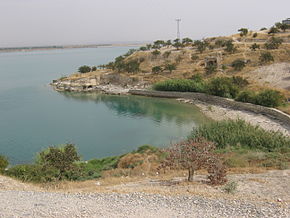Zeugma, Commagene
| Ζεῦγμα | |

Parts of Zeugma have become submerged in the Euphrates River since the construction of the Birecik Dam
|
|
| Location | Belkis, Gaziantep Province, Turkey |
|---|---|
| Region | Commagene |
| Coordinates | 37°3′31″N 37°51′57″E / 37.05861°N 37.86583°ECoordinates: 37°3′31″N 37°51′57″E / 37.05861°N 37.86583°E |
| Type | Settlement |
| History | |
| Builder | Seleucus I Nicator |
| Founded | 300 BC |
| Site notes | |
| Condition | Partially submerged |
Zeugma (Greek: Ζεῦγμα) is an ancient city of Commagene; located in modern Gaziantep Province, Turkey. It was named for the bridge of boats, or , that crossed the Euphrates river at that location.
Originally, the ancient city of Zeugma was founded as a Greek settlement by Seleucus I Nicator, one of the generals of Alexander the Great, in 300 BC. The city was called "Zeugma", because of the bridge across the Euphrates River that was made of pontoons, thus connecting the two banks of the river. In Greek, "zeugma" means "bridge-passage" or "bridge of boats". The population of the city at its peak was approximately 80,000.
In 64 BC the city was conquered and ruled by the Roman Empire. During Roman rule, the city became one of the attractions in the region, due to its commercial potential originating from its geo-strategic location because the city was on the Silk Road connecting Antioch to China via a bridge of pontoons across the river Euphrates, which defined the border with the Persian Empire until the late 2nd century.
In 256 AD, Zeugma experienced an invasion and was destroyed by the Sassanid king, Shapur I. The damage from the invasion was so drastic that Zeugma was not able to recover for a long time. To make the situation even worse, a violent earthquake buried the city beneath rubble. Indeed, during the rest of its time under Roman rule, the city never regained the prosperity it had once achieved.
Zeugma and environs remained part of the Roman empire. During the 5th and 6th centuries the city was ruled by the Early Byzantium or Eastern Roman Empire. As a result of the ongoing Arab raids the city was abandoned once again. Later on, in the 10th and 12th centuries, a small Abbasid group settled in Zeugma.
...
Wikipedia

